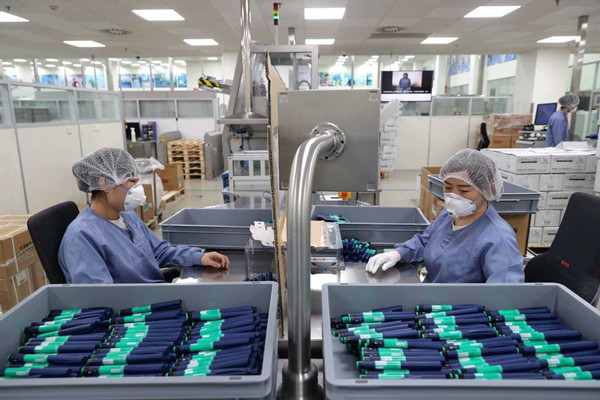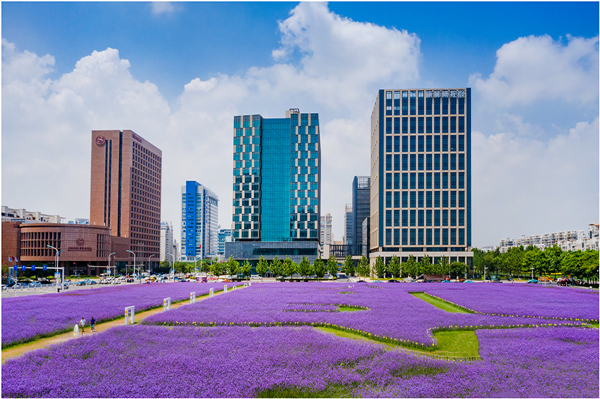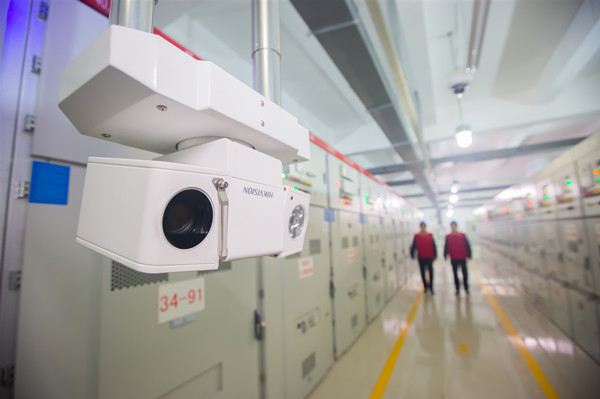Binhai's biomedical industry to hit 100 billion yuan by 2025
(exploringtianjin.com)| Updated : 2021-08-27
Print Print
Employees work on the production line of a Novo Nordisk venture in Tianjin. [Photo provided to exploringtianjin.com]
The Binhai New Area in North China’s Tianjin Municipality projects that its biomedical industry will achieve an annual income of 100 billion yuan ($15.44 billion), by 2025.
Tens of billions of yuan’s worth of well-designed industry clusters dedicated respectively to pharmaceutical, biotechnology, medical device, diagnostics and modern Chinese medicine will take shape and be formed in the area.
By 2025, Binhai will have been shaped into a highly innovative and internationally competitive drug development and drug manufacturing piloting zone, characterized by its comprehensive subdivisions and variety of complete medical products.
To achieve this goal, the industrial structure will be steadily optimized, forming industrial parks that will be dedicated to the research and production of cells, medical device, vaccines and more. National key laboratories, leading enterprises and institutions will be introduced to strengthen the industrial drive of the area.

A picture of Binhai New Area [Photo provided to exploringtianjin.com]
At present, Binhai is already an important area for the biomedical industry in Tianjin, which in turn is recognized as a national base for the bio-industry, medical and health product exports, the modern development of Traditional Chinese Medicine, and stem cell research.
The biomedical industry is one of the four-star strategic emerging industries in Binhai. In 2020, the district's biomedical industry output value sat at 40.25 billion yuan, accounting for 64.2 percent of the city's total biomedical output.
The biomedical industry of the area’s TEDA is listed among the first batch of national strategic emerging industrial clusters.
Binhai has issued comprehensive favorable policy package concerning all involved innovative elements from floor to ceiling, including support to cultivate innovation-driven enterprises, facilitate turning scientific vision into products, protect intellectual property, financial instrument, attract qualified human resource and improve public services.
The area also builds a biomedical innovation and entrepreneurship alliance comprising 206 medical institutions across the city. It has carried activities to integrate resources of industrial chains, technology, capital and talents across the members.

Smart technology applications used extensively in Binhai. [Photo provided to exploringtianjin.com]
The new area has gathered together more than 1,500 biomedical companies, which have made scientific achievements in key areas, such as vaccines, recombinant proteins, stem cells, and high-end medical devices. Smart technology applications have gradually been applied to facilitate the upgrading and modernization of production and manufacturing. The area has also seen an increase in international cooperation and roles.
Here are some of the fantastic companies joining in the area: CanSino Biologics is the Chinese developer of a one-shot COVID-19 vaccine as well as vaccines for 13 diseases including Ebola virus disease, and meningitis. Novo Nordisk, a global leader in diabetes care, is the largest insulin manufacturer in Asia. Asymchem, China's top ten CDMO companies. KingYork Group, China's largest producer of cortical hormone. JF-Natural, China's largest producer of grape seed extracts. WuXi AppTec, the largest pre-clinical CRO company in Asia. China Medico Corporation, a leader in the Chinese medicine industry.
Binhai is now luring international talents to further boost its biomedical industry.